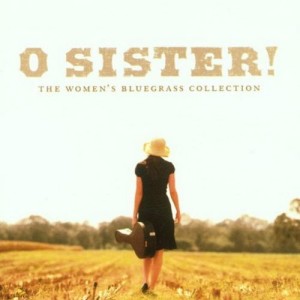 If mainstream country music was dominated by men in its early years, the same was doubly true of bluegrass. With a few exceptions, bluegrass has been largely a men’s genre for much of its history.
If mainstream country music was dominated by men in its early years, the same was doubly true of bluegrass. With a few exceptions, bluegrass has been largely a men’s genre for much of its history.
But women have always been involved in bluegrass, particularly in the past 30 years. And a case could be made that the present moment is something of a golden age for women in bluegrass.
That fact and the current resurgence of bluegrass and old-time music make this a perfect time for Rounder’s new release, O Sister! The Women’s Bluegrass Collection. And Rounder is the label to do it, because it has supported bluegrass women for many years.
This is a thoroughly enjoyable introduction to bluegrass music made and sung by women. The title, of course, is a reference to the mega-platinum-selling soundtrack to the movie O Brother Where Art Thou? and the album’s artwork plays on the reference as well. But this is not derivative music, nor is it a bunch of musicians jumping on a bandwagon. These are women who have toured and recorded for years, paying their dues and earning their right to sing the high-lonesome blues. And the songs are a blend of traditional and contemporary numbers, many of them addressing the concerns of rural women.
Hazel Dickens could be called the matriarch of bluegrass women, and her imprint is all over this recording. That’s a good thing. Her rugged, hard-edged voice imparts an authentic old-time sound to every track she sings on, her bass playing is always on the money, and her sincere and uncluttered lyrics and tunes make for some of the best country songs around.
Her early recordings were made with Alice Gerrard (wife of folksinger Mike Seeger), and Bill Monroe’s “True Life Blues” is a good example of the work this duo did in the early ’70s. She teams up with Ginny Hawker on Dickens’ haunting ballad “Old River,” and with Carol Elizabeth Jones on “I Can’t Find Your Love Any More.” And she sings harmony behind Phyllis Boyens and Jones on two gospel numbers, the traditional “The Last Old Shovel” and Molly O’Day’s “Comin’ Down From God.” All but “Shovel” are from Dickens’ Rounder album *Heart of a Singer*, which sounds like it’s a must-have for any bluegrass fan.
Many of the remaining artists on O Sister are from the current crop of younger bluegrass women. Allison Krauss, Laurie Lewis, Claire Lynch, Lynn Morris, Rhonda Vincent and several others all make worthy contributions. They are backed by a bunch of excellent musicians as well, including Krauss’s Union Station band, the Johnson Mountain Boys, bassist Missy Raines and the outstanding dobro of Rob Ickes.
The musical styles range from the old-time sound of Carol Elizabeth Jones’ “Comin’ Down from God,” featuring Lynn Morris on clawhammer banjo, to the traditional country sounds of Claire Lynch’s “If Wishes Were Horses,” Suzanne Thomas’ “Silver Tongue and Gold Plated Lies” and The Cox Family on the old Jim and Jesse song, “Pardon Me.” Wilma Lee Cooper’s “You Tried to Ruin My Name” betrays the Celtic roots of bluegrass, particularly in its rhythmic structure, and John Reischman and Tony Furtado play some mandolin and banjo breaks that verge on rock ‘n’ roll in Kathy Kallick’s bluesy “Just Like Rain.”
If the selections on O Sister are at all representative, women who perform bluegrass music seem to be more interested in the songs than in pure instrumental prowess and speed for its own sake. And the songs themselves are more often than not powerful and evocative, frequently drawing on the natural world — wind, rain, stars, rivers and mountains — as metaphor for the ups and downs of relationships and the joys and sorrows of life.
But they’re also excellent musicians as well as singers and songwriters. A real treat of this collection that illustrates that point is the final track, a live cut from the 1999 International Bluegrass Music Awards featuring Laurie Lewis (fiddle), Claire Lynch (guitar), Lynn Morris (banjo) and Rhonda Vincent (mandolin). They give Kieran Kane’s “Eight More Miles” a vigorous workout, taking turns singing the verses, joining in harmony on the chorus, and playing some wicked intrumental breaks in between.
O Sister is a good sampler of Rounder’s catalog of women in bluegrass, and it wouldn’t be out of place in any bluegrass fan’s collection.
(Rounder, 2001)
